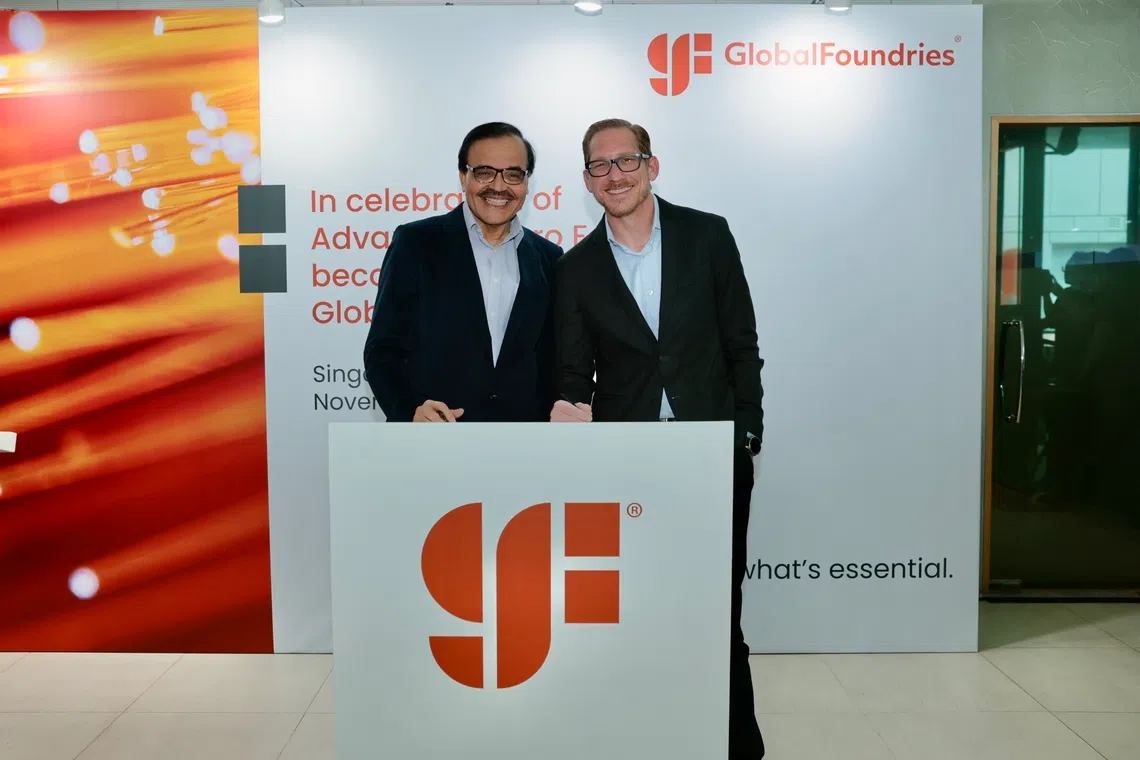GlobalFoundries acquires Singapore semiconductor firm in push to expand AI portfolio
Advanced Micro Foundry specialises in silicon photonics, a technology that allows for faster and more efficient data transmission

[SINGAPORE] The New York-headquartered semiconductor company GlobalFoundries is acquiring Singapore’s Advanced Micro Foundry to get access to a technology that is increasingly being used in data centres.
Advanced Micro Foundry specialises in silicon photonics, a technology that uses light instead of electricity to transmit data. This allows for faster and more energy-efficient data transmission, and it is increasingly being used in data centres due to its ability to better handle the demands of artificial intelligence (AI) applications.
“The technology road map that Advanced Micro Foundry has is complementary to the GlobalFoundries road map,” Kevin Soukup, GlobalFoundries’ senior vice-president of its silicon photonics business, told The Business Times ahead of the official announcement on Tuesday (Nov 18) morning.
He declined to reveal the financial details of the acquisition, saying only that this is GlobalFoundries’ second-largest acquisition of a Singapore-based semiconductor company.

GlobalFoundries acquired Singapore’s Chartered Semiconductor for US$3.9 billion in January 2010. Both Advanced Micro Foundry and Chartered Semiconductor were backed by Singapore government agencies.
Soukup said the silicon photonics business is a segment that is “growing rapidly” for GlobalFoundries, and that revenue for its silicon photonics business has “doubled” from 2024.
Navigate Asia in
a new global order
Get the insights delivered to your inbox.
“Our goal is to do the same thing as we continue into 2026. We’re in a world that really loves data,” he said.
GlobalFoundries makes chips that are used in smartphones, the automotive industry and smart home appliances. But like many semiconductor companies around the world, it is also benefiting from the generative AI-driven tech boom.
In its most recent quarter ended Sep 30, 2025, GlobalFoundries’ communications infrastructure and data centre segment was its fastest-growing business.
Revenue for that segment grew 32 per cent to US$175 million, helping offset declines in its smart mobile devices, and home and industrial Internet of Things segments. Overall revenue for the company stood at US$1.69 billion, down 3 per cent from the same period the year before.
Yet, its chief executive officer Tim Breen is optimistic about the communications infrastructure and data centre business. He said at the earnings call last week that the company “envisioned silicon photonics to become a US$1 billion-plus run rate business for GlobalFoundries before the end of the decade”.
New R&D centre
GlobalFoundries’ acquisition of Advanced Micro Foundry is complementary. While both companies already have their own silicon photonics manufacturing capabilities, the combined entity will marry Advanced Micro Foundry’s manufacturing assets, extensive intellectual property and skilled talent with GlobalFoundries’ global footprint.
Soukup said GlobalFoundries would become the largest silicon photonics pure-play foundry by revenue following the acquisition.
As part of the deal, GlobalFoundries will be setting up a silicon photonics research and development (R&D) centre of excellence in Singapore together with the Agency for Science, Technology and Research (A*Star) – the country’s lead public-sector R&D agency – as part of a master research collaboration agreement.
The semiconductor industry contributes close to 7 per cent of Singapore’s gross domestic product. The government is investing over S$1 billion in semiconductor R&D to capture opportunities in the AI-driven economy, and strengthen its position as a regional semiconductor manufacturing and innovation hub.
In a statement, A*Star said the latest agreement deepens the collaboration between A*Star and GlobalFoundries, and underscores the American chipmaker’s commitment to expanding its production and R&D operations in Singapore.
“Our collaboration with GlobalFoundries builds on nearly two decades of national investment and capability development. It reflects strong confidence in Singapore’s translation R&D strengths,” said Beh Kian Teik, chief executive of A*Star, adding that it will deliver new economic opportunities for Singapore.
Decoding Asia newsletter: your guide to navigating Asia in a new global order. Sign up here to get Decoding Asia newsletter. Delivered to your inbox. Free.
Copyright SPH Media. All rights reserved.



